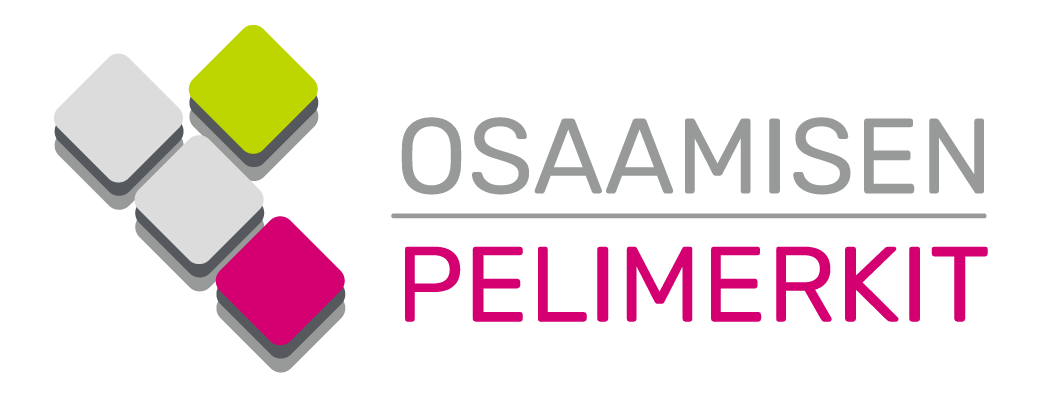Lue tämä suomeksi
How to attract the game company’s interest when searching for a job? The professionals advise to make a lot of games! This is an outcome of the interviews made for game industry professionals, who answered the questions about junior applicants, and the challenges linked to internship and the recognition of skills. A senior consultant of Games talents acquisition, Arja Martikainen, who also has a long experience at Games Jobs Finland and Barona, comments the interview results. At the end of this article you can find a list of qualities that might help an applicant.
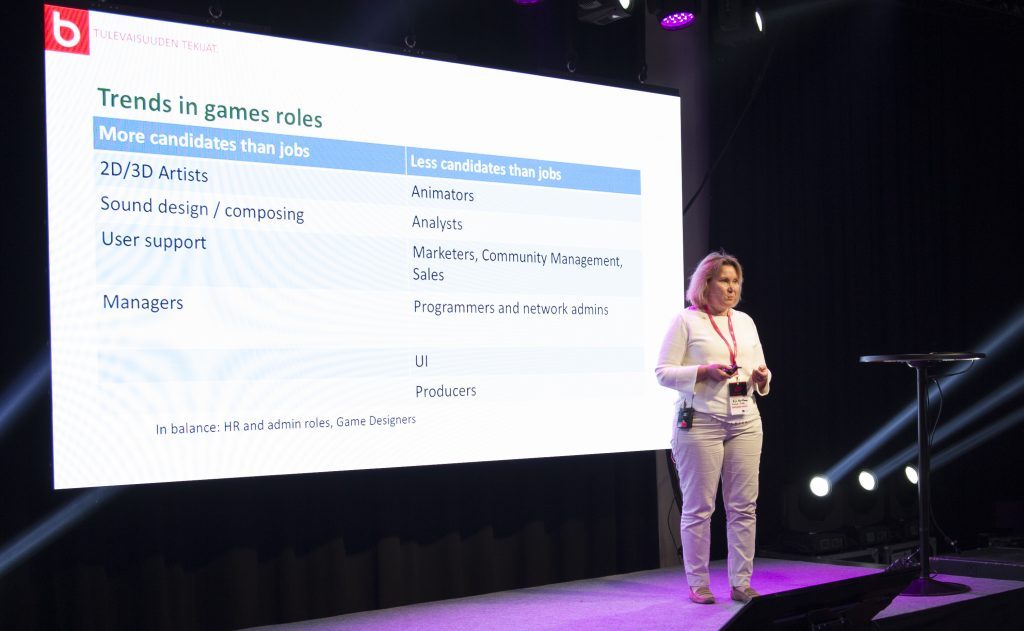
Abstract:
During the autumn and winter 2018 we interviewed 12 game professionals from different parts of Finland. The questions concerned junior applicants, internship from the company’s point of view, and the recognition of skills. In addition, over 30 statements were presented. The respondents represented different professions.
The often mentioned wishes of the skills and experience of the applicant were related to the shipped games, hobbies, teamwork and communication skills, motivation and ability to learn. In addition, other wishes were related to the portfolio and work samples that they would be carefully prepared, and the applicant would also make clear what is his/her part of the final team work. If the applicant bothers to find out some information about the company he/she’s applying to, that counts as a good motivation. This is wish that also Arja Martikainen recognises and confirms: she mentions that many have been caught up in lack of genuine interest in the interview. The studios and other technology houses require more evidence of self-development.
The single, technical skill demands were not asked in the interviews, but often the respondents said that that they wish the applicants would master the basic tools of their own field. If they also have a supportive skill on the side, that’s a plus.
Conducting the interviews
The interviews were conducted as a follow-up to the electronic survey conducted in spring 2018. The survey was made to find out more about sector-specific future needs, and its results are summarized in this article. The interviews were used to get a deeper knowledge of the survey’s subjects. 12 game industry professionals from all over Finland were interviewed during autumn and winter 2018. They represented a variety of proficiencies in game companies of different sizes. Therefore, one can say that the field is well represented. What was particularly interesting in the interviews was the repetition of certain things in the answers of different respondents. Mostly these recurring elements have been used in the assembly, and other additions are involved mainly as a curiosity.
The quote examples are used to clarify the answers because some of them were sometimes quite broad. Therefore, reducing the response to the smallest unit is always the author’s own interpretation. The examples are intended to give the reader the most realistic and clear picture of the answers.
Interviews were conducted in a semi-structured method, ie all the interviewees were asked the same questions (n=7). Complementary examples had been considered for the questions if the question was not clear to the interviewee as such. In addition, 31 closed questions were presented as statements. Interviews were conducted by several people in different ways: some were conducted as telephone interviews that were recorded and transcribed. Some of the interviewees were sent questions electronically and they were able to answer questions independently. Some of the interviewees have not answered some of the questions at all, and one of the recordings was interrupted at the end. The English-speaking respondent had the questions translated, but an error had occurred in a couple of the translations. These answers have not been utilized in the material.
Question 1.1: What are the expectation for the graduated job seekers, and which expectations are not met?
The answers for this questions can be roughly divided into three main categories; expectations for:
1) experience,
2) technical skills, and
3) other skills and knowledge.
The experience related expectations included for example the completed games, that one used to call your own finished project, and the portfolios. Both who mentioned portfolios, said also that there are some shortcomings.
The technical skill related expectations included mainly a wish that the person masters the basic tools of his/her own field. One concrete hard skill is expected, and in addition at least an understanding of other tools that might be needed. As on respondent puts it: “ We’re looking for generalists with wide competence of different fields.”
Social skills, team working skills, communication skills and an independent approach to work / initiative are mentioned as expectations of other skills. In addition to these; talent, passion for your own work, will and ability to learn new things and motivation as a combination for these were mentioned by at least a couple of respondents. Also problem solving skills was mentioned as a desired quality. This was mentioned as such only in one respondents answers, but a comment of another respondent is distantly related to this; he linked the lack of initiative to the junior applicants: “doesn’t analyze what could be done better”. A problem solving skill can somehow be linked to initiative.
Other occasionally mentioned statements of desired skills were “understanding the pipeline of game development”, “understanding of game business market”, and “understanding of business”. These skills are not necessary on all fields, but the claims pointed out that “the game industry needs more business competence” was quite highly agreed.
Dedication to gaming can relate to the previous aspects because it can combine all three themes: experience, technical skills and other skills. One respondent crystallizes the point of view in a following way: “dedication to gaming and a will to deepen one’s own competence are important things, and are missing from some people.”
The employers’ side had also expectations for the job seeking process, they hope that applicant would find out where they are applying to and what kind of expectancies the employer possibly has. In the application process it would be important to show your own skills reliably: it is quite common an applicant will show some group projects to display his/her experience so it is important to separate the ownership of what is being shown with precision.
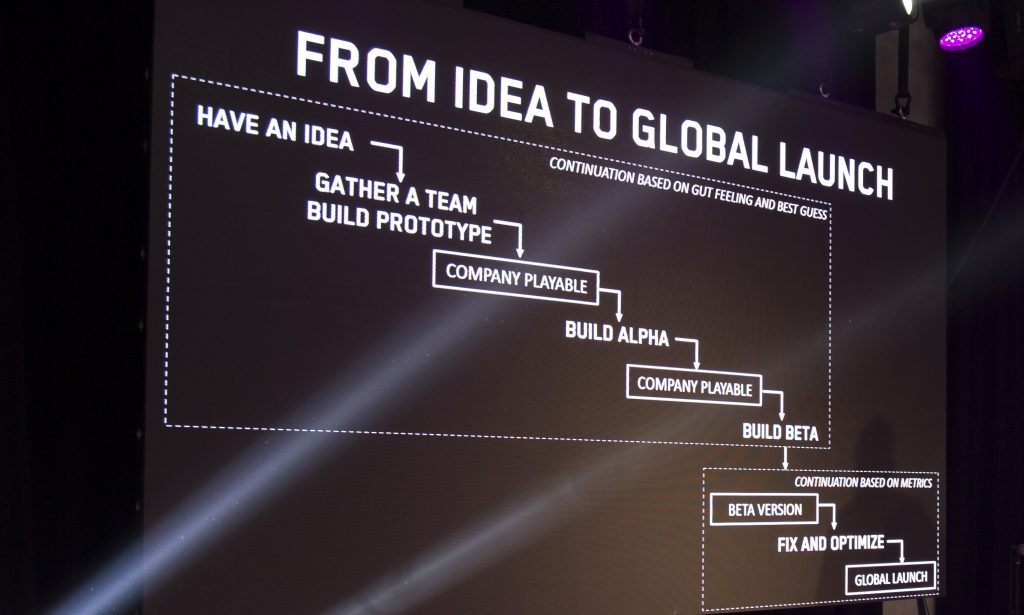
Question 1.2: What kind of skills and projects benefit a job seeker the most?
The answers to this were consistent with the previous paragraph and were also quite unanimous. The most important experience was that the applicant has made a game or games, preferably from the beginning until the release. It was especially important that the game was completed. Some of the respondents mentioned the same through game projects that “the job seeker has done something in a multidisciplinary team”. The main difference was that some people preferred the experience of several projects, but for some even one project was enough. Supplementing the previous question the management of basic tools of your field was also briefly mentioned in here, as well as excellent management of one skill, and a proficiency of some supportive skill.
The portfolio was also mentioned here a couple of times, even though it does not really answer this question. In particular, it was hoped that the portfolio would be broad and that it would clearly depict the work done by the applicant. In the same category of facilitating the employer’s work was the following answer: “Ideally, the work sample game could be played with minimal effort, eg in Appstore.
In addition, other occasionally mentioned statements depending of the professional field of the respondent:
- ”wide understanding of different kinds of games”
- ”understanding of the difference between PC and mobile”
- ”autonomy”
- ”understanding of the monetization ”
- ”experience in the use of agile or lean”
- ”code samples”
- ”ability to adapt to the needs of the company”.
Question 1.3: If you have met an interesting junior job seeker, what made him/her interesting?
The following options were offered as a help for the question: “personality, projects, motivation, and dedication to gaming/hobbies”. Most of the respondents took advantage of the options; the above-mentioned interest-generators received a lot of support. Seven respondents mentioned motivation, six hobbies, five personality, and four mentioned the projects. One of the interviewees had not answered this question. In addition to the given options, a few also mentioned the ability to learn and how the person would fit the team.
Among the individual factors that attracted attention were for example the following: attitude, creative problem solving skills, well completed studies, humility, flexibility, good work ethic, nice personality that fits well the group, competences that are made visible, and substance expertise. One respondent’s view crystallizes pretty well the above-mentioned things: “The personality, ability to learn and motivation quite often override the technical abilities of a job seeker in my opinion. – – Most of the time someone with creative problem solving skills and understanding of the basics will be able to grow very fast and become more valuable than someone who knows it all but has a very negative and stubborn attitude.”
Question 2.1: From the company’s point of view what are the biggest challenges for the internship?
A couple of common denominators arose from the answers. The internship has to base on the real tasks and a real need. The lack of suitable tasks results in the difficulty to appoint an intern. Another often mentioned factor is the resource for supervision. A rush in developing a game or small teams make it challenging to find a mentor. A couple of respondents say this is because the interns are not autonomy or good enough so the supervision requires a lot of time. One says on the other hand, that they have mentors and the level of knowledge of newcomers is not a problem.
There was a lot of variation in the opinions about a suitable duration of an internship. Some said that the duration at the moment is good without defining the current duration referred to. One said that during two weeks he can tell whether there’s potential in the trainee. Another respondent said that six months would be good. Other answers located somewhere in between, if an exact duration was mentioned at first place. In addition, many mentioned that ideally, internships should result in a job. Consequently, the internship period serves as a probation.
Other occasionally mentioned statements of the internship were for example the following: the trainee has to be autonomy, but to be able to follow the instructions. Have to be able to start from the bottom and work the way up. In addition, it was mentioned that the phase of the project affects a lot: “in the beginning it’s easy to take interns, but in the end it’s difficult to find reasonable tasks”. Even though the autonomy is wanted one respondent calls for the courage to ask if the trainee doesn’t know something. Also the schools were criticised by one respondent who said that the internship process is unclear and non-structured and it would benefit from a clearer pipeline.
A role of the Universities of Applied Sciences in a progress of the trainee is obscure, and there could be more common interface that would result in a win-win situation for both. Arja has a strong vision about this as well as she has helped several interns and companys to find each others. She says that teachers play an important role in the success of the internship. Some are very networked and aware of the needs that the industry has. Thus they are able to guide and market the students better. Good working life relationships in a school or education sector have a great impact on the reputation in the labor market.
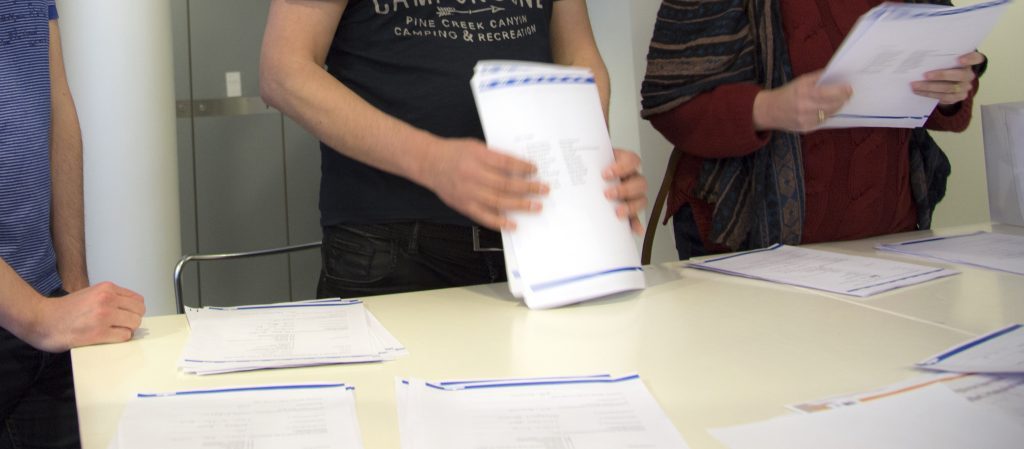
Question 3.1: What kind of a challenge you consider in identifying a new applicant’s / new employee’s skills or competencies?
In this question, the respondents answered more about methods they use to identify the skills, than the actual question. Some said that by these means the identification of skills is not difficult, while others said it was sometimes challenging. A big part of them told that they carry out tests for the applicants. In addition, preliminary assignments, interviews, portfolios, and demonstrations help evaluate the skill level.
The previously mentioned “based on the work samples it is hard to say who has really done it” was said again at this point. In addition, it was stated that “it is not difficult if the applicants are able to communicate their skills”. On the other hand, one company trusts that “recruiting experienced people is more convenient”. Arja said that from her fifteen-year timeframe, she only recalls a handful of those who tried direct scams, so the risk of misjudging the correct author of the work samples is obviously low. The interviewees may have referred more to the fact that there is a lot of wasted time in recruiting session when trying to assess a contribution of the particular applicant in an ambiguous sample or portfolio.
Question 3.2: If a person or a job seeker had an electronic folder containing open badges (skill badges), would you use this folder?
This question was interesting because most of the respondents have probably never heard of the open badges. A brief description of the subject was given with the question, but without their own experience or practical examples, their conception is limited. However, it was important that this issue was involved, because in the Chips for Game Skills -project these badges are being created for the gaming industry.
The answers were basically divided in half. Some said directly that they would use them, or at least “they could be useful”. The most critical of the respondents didn’t say directly that they would never use them, but their estimates were the “probably not” type. However, both response camps had very good views on the potential of the badges. Of these, you can easily see the repetition of certain things:
- “If the recruitment process can be facilitated by some standardization, it would be more efficient. Depends who evaluates, commonly known criteria.”
- “Peer review sounds more interesting than course performance.”
- ”Depends on how it’s granted (credibility). A big job who will evaluate it and who will pay. ”
- “The standard would help in the assessment of competence. We would use it to evaluate job seekers. ”
- “If it was standardized and accredited. Companies involved in adopting a quality level independent level. Could motivate students and facilitate HR processes – as long as the industry (companies) commit themselves to doing so. ”
- “I would make use of it, would not be so dependent on the applicant’s materials.”
- ”Yes, it would be used, but a “trustworthy” is a difficult concept: who you can really trust. Are the criteria reliable for certain. And is the issuer / teacher competent enough to assess the competence? The folder would not replace the applicant’s own portfolio. If in the long run it turns out to be trustworthy and level similar enough in different institutions, it would increase the reliability of the folder. Does it need an external reviewer?”
Question 3.3: Would your company have the willingness to apply for such free recognitions also to your own staff?
In these answers, too, there was a large variation. However, interesting applications were found:
- “Depends on the amount of work, could be useful in, for example, applying for an investment.”
- “Possibly – could be useful in selling subcontracting projects.”
- “It would make it easier to recognise skills and competence and communicate them to customers.”
- “You would not need to organize your own skill surveys. Could find new skills. ”
- “The badges could determine the internal skill level of the company and give value to the skills.”
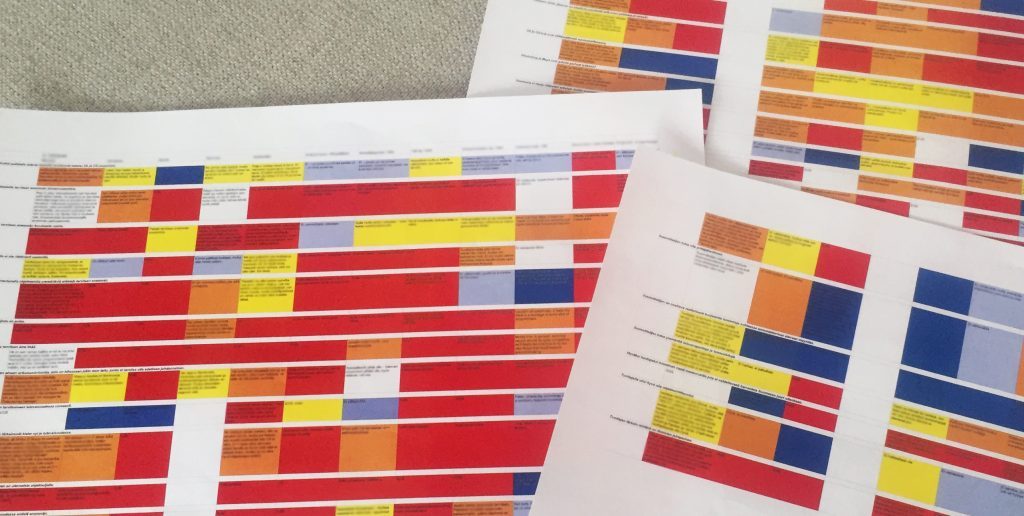
The statements:
Finally, 31 statements were made to the interviewees, which could be answered to its minimum of affirmative or negative. Most respondents, however, were enthusiastic about opening up the subject. There were many claims, however, and the total number of replies exceeded several pages, so the statements the respondents most agreed are opened here.
Replies were classified into six categories with color coding. Red was the strongest expression of like-mindedness with the statement. Orange was quite strongly in agreement. The yellow was quite neutral, or the “on the other hand” type response. Light blue was in somewhat disagreement, and blue disagreed completely. In addition, white was left for replies which did not clearly indicate the respondent’s position to the claim.
The biggest agreement was on the following statements:
- There is a shortage of server programmers
- Skilled programmers are always needed more
- C # and C ++ are the main languages for programmers now and in the future
- Teamwork skills and communication skills are very important in game development
- The designer should also be able to design the game’s monetization
- The main task of the producer is to lead people
- Unity and Unreal Engine expertise are essential for the programmer
None of the above mentioned, except for one, had any diverging opinions, only answers from the red or orange category. Only in the last part, the game engines, became a different view, emphasizing that “the understanding of game engines in general is better than being expert in a single engine”.
Respondents were quite well in agreement on the following:
- More business expertise is needed in the gaming industry
- More technically-oriented programming artists are needed
- An ideal expert is a specialist in one area who has some other skill up his sleeve that doesn’t have to affiliate with the previous one
- Fullstack professionals will be needed more in the future
- A programmer and also an artist should understand the business part
- It is essential for each team member to understand what others do in the game team
- The main features of a designer are systematic planning, perseverance, customer orientation and creativity
In all of these responses over a half confirmed the claim, but there were a few either neutral or dissenting opinions.
In connection with the statements Arja stated that there are “a few points that are very easy to confirm, for example, it would be good for a programmer to understand business.” Arja said that on a senior level the understanding is starting to be on a good level, but it is not indispensable for a beginner. “A minimum requirement would be for developers to take a positive view of the company’s financial target and to help them achieve their best. If the product is selling it enables that the company continues to operate and maintain the jobs.”
Electronic survey vs. interviews
Electronic surveys for professionals were conducted in early 2018. It asked, among other things, the future skills needed in different professions. Instead, the wish expressed in those responses that almost everyone in all professions should be able to code is not confirmed by the interviews. Many told it to be useful, but did not see the skill as necessary.
The importance of teamwork skills and communication skills was emphasized in both the survey and interview responses. However, the statement “current applicants have shortcomings in teamwork and communication skills” presented in the claims did not receive unanimous support. Fragmentation manifested towards both extremes.
The most interesting sections of the electronic survey, that intertwine with these interviews, can mostly be found at the end. There was asked the differences between senior-level professionals compared to juniors. Many such skills were read in favor of seniors that were mentioned in the interviews to be the strengths of a job seeker.
To quote some survey answers:
- “Teamwork skills, understanding schedules, initiative, knows how to mentor, knows more than his/her own area of expertise.”
- “Big thoughts on their own skills and rosy picture on the timeline of game development (Junior, ed. note)”
- “Extensive vision and responsibility brought by experience”
- “Ability to perceive entities”
- “Senior knows how to prioritize”.
Instructions for job seekers
The first thing that came up when reading the answers was that certain things repeat many times, also in the answers of different topics. Some of these did not come as a surprise, but it is good to confirm the vibes with the results of a research. These often mentioned hopes for juniors could be summarized as a guideline. Here’s a summary of what a junior seeking for a job or training position should take into consideration both at the application stage and before the first search is at hand. The guideline also takes into account the tips given to juniors in the results of the electronic survey.
Dear game industry-oriented junior:
- Make games, preferably in a team, make games, and make more games. Be involved in a process from idea to publication as often as possible.
- Invest in your portfolio and work samples and clearly highlight your role in them.
- Find out what kind of a place you are trying to get in and what they might expect from you.
- Learn the basic tools in your field well, and learn, if possible, other supportive skills.
- Be also interested in other types of games than your favorite genre.
- Be interested in what other team members are doing and what their job profile is in generally.
- Communicate, ask questions and make suggestions.
In addition, remember: you don’t know everything yet, you are still learning, receive feedback and guidance.
Arja also had a list for job seekers at the industry, and it contains pretty much the same things as in the interviews. Additionally she would give some tips for the interview stage: try to relax and be present, stick to the point, tell just the truth, and remember to sell yourself. Games Jobs Finland also has websites that provide more tips for job search.
In addition to all these instructions if you’re good at what you do and you are doing it with passion, the job is already practically yours. Good luck!
